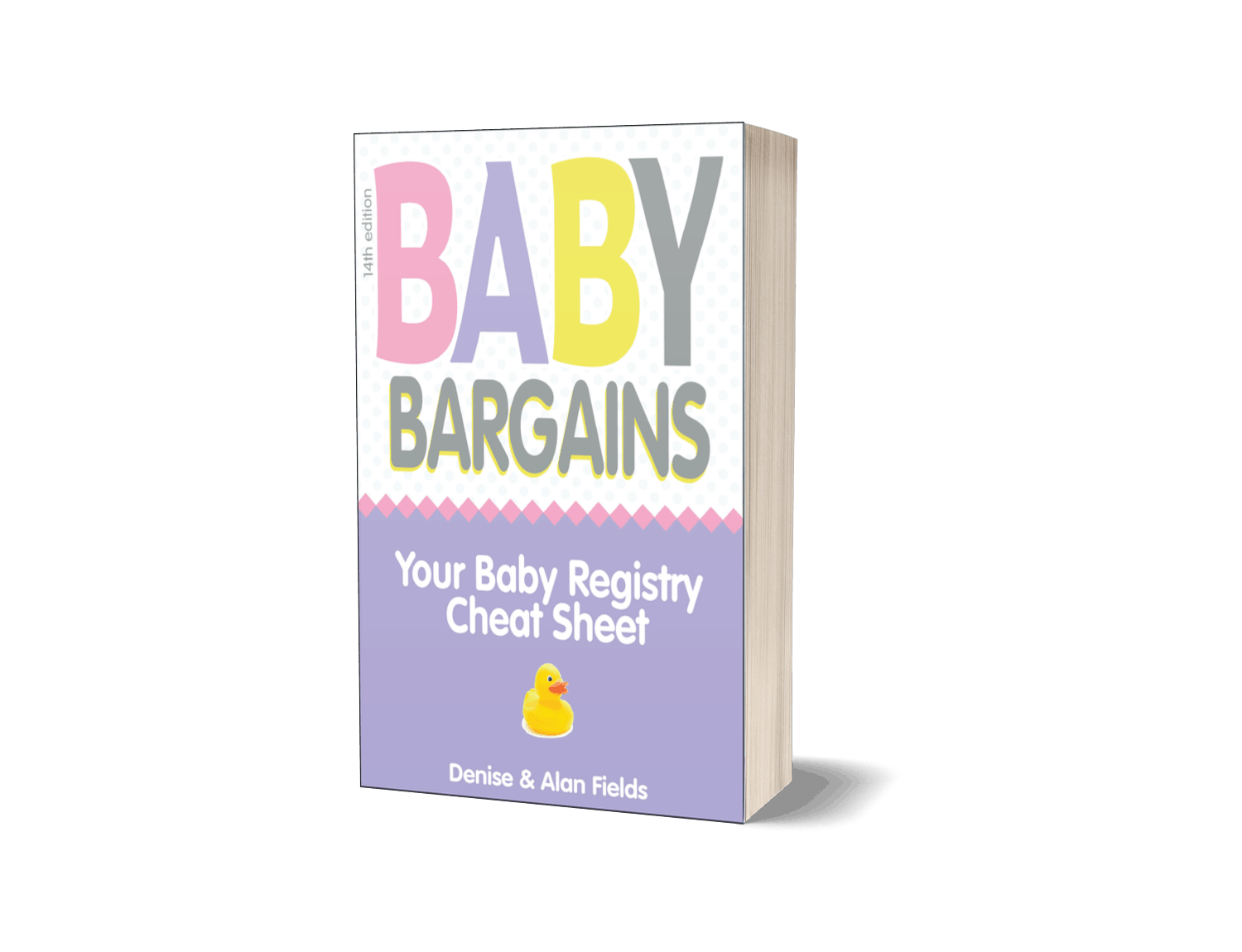
Last Updated: .
FYI: We are Baby Bargains, the #1 online resource for honest and independent baby gear reviews. Good news: we don't take money or freebies from the brands we review. Baby Bargains is 100% reader-supported!
Best Infant Formula
Check on Amazon
Best Baby Formula: Enfamil NeuroPro Infant Formula
Lets’ talk baby formula. After comparing and testing over 15 baby formulas, we choose Enfamil NeuroPro Infant Formula as our top pick for best name brand formula.
We consulted over 100 pediatricians before making this pick. We poured over research results and lab testing on 15 name-brand formulas. Finally, we interviewed over 500 of our readers over a three year period, to gauge parent feedback on 15 formulas. Here’s why we picked this formula:
What We Liked
• New ingredients linked to less sickness, higher IQ. The big news this year is MFGM, which is found in human breast milk. Combined with DHA (older versions already had this), this additive improves cognitive development and has been linked to less sickness (especially ear infections) in peer-reviewed studies.
• Includes prebiotics.
• Affordable.
Best For Fussy Babies
Check on Amazon
Best For Fussy Babies: Enfamil Gentlease Sensitive Baby Formula
Yes, all baby formula must have the same nutrition requirements, but that doesn’t mean all formula is made the same way. Case in point: Enfamil’s Gentlease formula, which aims to soothe fussy babies with tummy troubles.
How? It contains partially hydrolyzed protein. Hydro, what you say? Basically, the protein in this formula is already broken down, which makes it easier for babies to digest. Here’s more:
What We Liked
• It works! Readers who have fussy babies say this formula does work to calm tummy issues.
• Less lactose than other formulas. Yes, this formula is milk based, but it has about one-fifth the lactose of regular formula.
• No GMO ingredients.
• Probiotics. This helps boost immune system development.
What Needs Work
• No prebiotics. Prebiotics are harder to give baby as a supplement so including them in formula is preferred. You can always give your baby a probiotic supplement.
• Pricey.
Best Organic Formula
Check on Amazon
Best Organic Formula: Earth’s Best Organic Dairy Infant Powder Formula with Iron
Is organic formula better than formula made with conventional ingredients? No—there is no scientific evidence it is better or safer. Organic is more of a lifestyle choice. And if you prefer organic formula, we’d recommend Earth’s Best. After evaluating a half dozen so-called organic formulas, we think this choice is the best bet. Here’s more:
What We Liked
• Milk based. We prefer this over soy-based organic formula—soy formula is not recommended by the American Academy of Pediatrics as the sole source of nutrition for premature infants.
Why? Dr. Bridget Young, a pediatrician who runs the Baby Formula Expert web site (and who consulted for our sister book, Baby 411) explains:
“Soy contains large amounts of phytate, which is a molecule that can bind to certain minerals and sequester them (translation = hold them hostage) so that baby’s intestines can’t absorb them. For this reason, soy-based baby formulas have to contain more minerals than those made from cow’s milk in order to ensure babies get enough minerals to grow.”
• Reminder: Earth’s Best formula is best for babies over five months old who already have tried dairy.
• No corn syrup solids. Yes, other formulas use corn-based sugars. This one does not.
• No GMOs. And it is made with ingredients that have been grown without synthetic pesticides or fertilizers.
• Kosher.
What Needs Work
• Foamy. When mixed, we noticed this formula can be somewhat foamy or frothy. Some parents think this can cause gas, but we don’t think it is a concern based on interviews with pediatricians.
• Fishy smell. When we tested this formula, we didn’t smell this, but we see a few reports from readers who claim this formula had a fishy smell—and that was a turn off.
Best Formula With HMO
Check on Amazon
Best Formula With HMO: Similac Pro-Advance Non-GMO Infant Formula with Iron
This non-GMO formula also wins our pick for best infant formula. Here’s why:
What We Liked
• Prebiotics include Human Milk Oligosaccharide (HMO) to boost immune system. This is a new chemical that has been identified in human breast milk that helps prevent sickness.
• No GMO ingredients.
• Affordable.
Why Trust Us
We’ve been rating and reviewing infant formula since 2005. In addition to interviewing nutritionists and pediatricians, we have combed the research to learn about nutritional standards and testing of formula. We also evaluate consumer reviews posted online, as well as our own message boards.
Much of our advice on formula (and feeding infants in general) comes from our best-selling sister book, Baby 411. This book is co-authored by an award-winning pediatrician who is an official spokesperson for the American Academy of Pediatrics.
Here’s another key point: we don’t take money from the brands we review. No free samples, no sponsors, no “partnerships.” Baby Bargains is your independent and unbiased source for expert baby gear reviews. We’ve been writing and reviewing baby gear since 1994. Yes, that long!
How we picked a winner
We evaluate infant formula based on both interviews with experts and in-depth research into infant nutrition and health., We check brands for overall quality and affordability. We also gather significant reader feedback (our book, Baby Bargains has over 1 million copies in print) parents.
7 Things No One Tells You About Buying Infant Formula!
1. Premixed formula will cost you.
Formula 101: there are three types of formula : powdered, liquid concentrate or ready-to-drink (pre-mixed). Liquid concentrate and ready-to-drink premixed formula is very expensive—50% to 200% more than powdered formula. A word to the wise: start your baby on powdered formula, not liquid concentrate or ready-to-drink. Why? Because babies get used to the texture of whatever they try first (powdered formula tastes different). Start on ready-to-drink formula and baby may refuse powdered formula.
2. Generic formula includes exactly the same nutrition as name brand formula.
That’s right, as we mentioned above, the federal government mandates that all baby food include the same nutritional ingredients. So what’s the difference between formulas? Some name brands include additional ingredients to help with digestion such as prebiotics. Whether you think those are worth the extra expense, that’s up to you.
3. Your toddler doesn’t need toddler formula.
In an attempt to keep parents buying formula way past the time kids need it, some formula manufacturers have created “toddler formulas.” These toddler formulas claim to contain more calcium, iron and vitamins, but nutritionists and pediatricians point out that toddlers should be getting most of their nutrition from solid foods, not formula. Toddlers should ideally only be drinking about two cups of whole milk a day. Whole milk should be served to toddlers between 12 and 24 months of age. At age two, switch to skim or 1% milk. By the way, whole milk is significantly less expensive than formula. No toddler needs “toddler formula” (unless instructed by your pediatrician for a health condition).
4. Formula makers like Similac and Enfamil have frequent buyer clubs you can join for coupons and other freebies.
Similac’s program is called StrongMoms Rewards while Enfamil has Family Beginnings. Of course, there is a trade off for all those freebies—formula companies want your personal info (email address, street address, birth date, etc). But no one said you have to use your main email address. Create another email address for joining clubs like this.
5. Be careful heating up a bottle of formula.
Turns out, most babies prefer a warm bottle of formula to a cold one. Who knew? And most parents will typically heat a bottle of formula in a microwave. But take care! Microwaves can heat formula unevenly, and hot spots within the liquid can burn baby. Make sure you shake it up after heating to disburse that uneven heat. And definitely test it on your wrist to make sure it isn’t too hot.
6. Your pediatrician gets lots of free samples.
That’s right, the formula companies bombard pediatricians with samples and most pediatricians don’t have lots of room to store them. Don’t be afraid to ask if your doctor has free samples. (But don’t start your newborn on ready-to-drink or liquid concentrate formulas, see tip #1 above!).
7. Don’t forget to factor in the cost of bottled water!
What, you say? Don’t you just mix tap water with powered formula?
No, bottled water is recommend by both the American Academy of Pediatrics and the American Dental Association. That’s because tap water can contain too much fluoride, which is a problem (discolored teeth). If your tap water contains .3 ppm or less fluoride, tap water is okay (ask your local water department for fluoride levels). But if fluoride levels are HIGHER than that, you should use bottled water.
And not just any bottled water: purified, demineralized, deionized, distilled or reverse osmosis filtered water is recommended. Also: be sure to boil that bottled water before mixing with powered formula.
Photo credit: Lucy Wolski

BabyBargains.com is a participant in the Amazon Services LLC Associates Program, an affiliate advertising program designed to provide a means for sites to earn advertising fees by advertising and linking to Amazon.com and its related sites. As an Amazon Associate, I earn from qualifying purchases.





 We obsess over gear for families and the home . . . so you don’t have to. Baby Bargains has one mission: help you find the best gear for your family with unbiased reviews by experts with 20 years of experience. At prices that don’t break the bank. When you purchase a product from links on this site, we make a small affiliate commission. Learn more
We obsess over gear for families and the home . . . so you don’t have to. Baby Bargains has one mission: help you find the best gear for your family with unbiased reviews by experts with 20 years of experience. At prices that don’t break the bank. When you purchase a product from links on this site, we make a small affiliate commission. Learn more 
